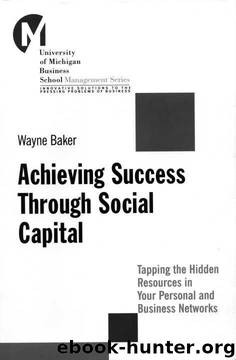Achieving Success Through Social Capital: Tapping Hidden Resources in Your Personal and Business Networks by Wayne E. Baker

Author:Wayne E. Baker
Language: eng
Format: mobi
Published: 2008-09-30T10:07:00+00:00
The preceding sections provide dozens of suggestions and examples for making your networks more entrepreneurial. These practices work. But they are mere words on paper until you act. You now know what to do. You have to couple what to do with the will to do. Only you can change your behavior.
The Will to Change
Using any of these suggestions requires a change of behavior on your part. There's no way around it. To implement a practice you have to move out of your comfort zone, change your daily routines, and step outside the normal rounds of your life. Change requires a will to change. After coaching many people over the years, I've learned a few lessons that might help.
• Discomfort is good. Most people interpret discomfort as a warning sign telling them to avoid something. The opposite is true for networking. Discomfort is a sign that you're doing something right. If you're not feeling uncomfortable, then you aren't moving out of your comfort zone. For example, meeting someone who is just like you is more comfortable than meeting someone who is different from you, but meeting dissimilar people diversifies networks. So if you feel discomfort, forge aheadyou're doing the right thing. As with any skill, the more you do it, the better you'll become and the more comfortable you'll feel.
• Behavior first, attitude later. Many people wait until they have prepared the right internal state of mind before they change their behavior. For example, they want to feel confident before they act confidently. These people never change. They don't because they have cause and effect backwards. New attitudes don't precede new behaviors; the reverse is true-new behaviors create new attitudes. Act confidently, and you become confident. Psychologists call this the as if principle. Act as if you are something and you become that something. Applied to networks, the as-if principle prescribes that you should stride forth and build networks; only then will you develop the attitude of a network builder.
• See network opportunities. Once, as a guest on WGN talk radio in Chicago, I had a caller who said, "I work sixty to seventy hours a week and I have no time to do any networking!" Lack of time is a common complaint. My response was that you are surrounded by network-building opportunities. But you see them only if you look for them. Evaluate all the opportunities that come your way. Make it a natural part of the work you do, a natural part of your life. Ask that one additional question, What is the networking potential in this opportunity?
• Seek small wins. In this chapter I've mentioned my colleague Karl Weick's concept of "small wins" as the embodiment of wisdom. It's worth mentioning again. Small steps can yield big payoffs. You have to do only a few small things to achieve big improvements in building your networks. Review your responses on Worksheets 3.1 and 3.2. Which practice would make your networks more entrepreneurial and be easy for you to do? Start with that one.
Download
This site does not store any files on its server. We only index and link to content provided by other sites. Please contact the content providers to delete copyright contents if any and email us, we'll remove relevant links or contents immediately.
Rich Dad Poor Dad by Robert T. Kiyosaki(6612)
Bad Blood by John Carreyrou(6611)
Principles: Life and Work by Ray Dalio(6421)
Playing to Win_ How Strategy Really Works by A.G. Lafley & Roger L. Martin(6238)
Management Strategies for the Cloud Revolution: How Cloud Computing Is Transforming Business and Why You Can't Afford to Be Left Behind by Charles Babcock(4563)
The Confidence Code by Katty Kay(4251)
Thinking in Bets by Annie Duke(4218)
American Kingpin by Nick Bilton(3875)
Delivering Happiness by Tony Hsieh(3418)
Project Animal Farm: An Accidental Journey into the Secret World of Farming and the Truth About Our Food by Sonia Faruqi(3212)
The Power of Habit by Charles Duhigg(3128)
The Tyranny of Metrics by Jerry Z. Muller(3065)
Brotopia by Emily Chang(3049)
The Marketing Plan Handbook: Develop Big-Picture Marketing Plans for Pennies on the Dollar by Robert W. Bly(3047)
Mastering Bitcoin: Programming the Open Blockchain by Andreas M. Antonopoulos(3035)
I Live in the Future & Here's How It Works by Nick Bilton(2993)
The Content Trap by Bharat Anand(2917)
Building a StoryBrand by Donald Miller(2896)
Applied Empathy by Michael Ventura(2892)
